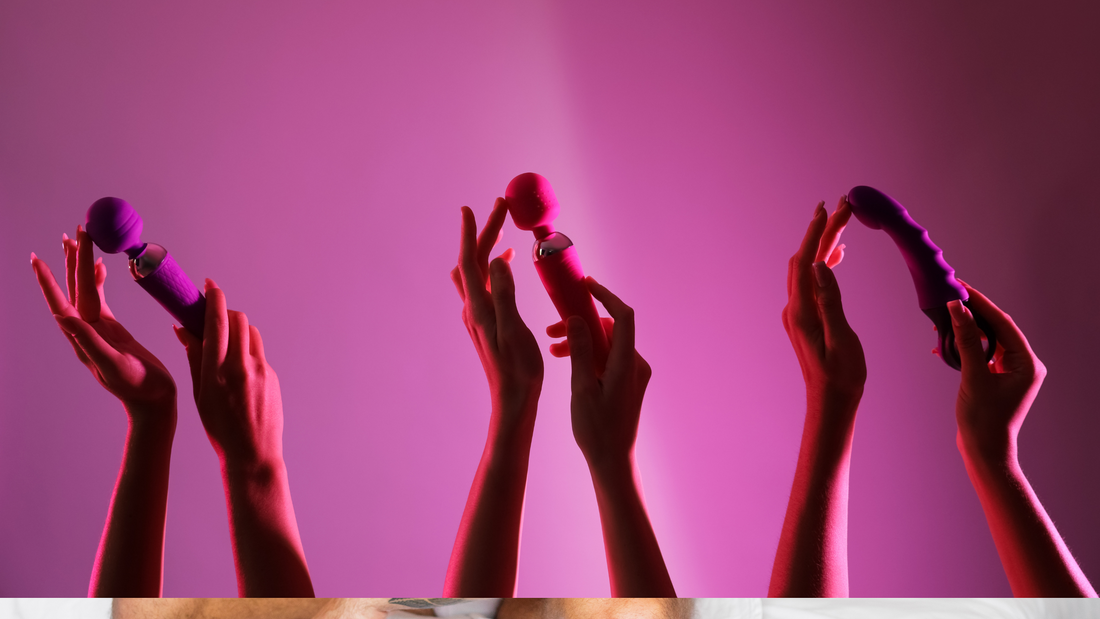
Are Vibrators Addictive? Debunking the Pleasure Myth
Share
If you’ve ever heard someone say “be careful — you’ll get addicted to that,” after mentioning a vibrator, you’re not alone.
The idea that vibrators are somehow bad for your body or that they’ll stop you from enjoying sex without them is a persistent myth — and it’s time we laid it to rest.
In this post, we’ll unpack where this myth comes from, what science and sex educators actually say, and why vibrators are not addictive — they’re just another way to explore pleasure.
Where Did the ‘Vibrator Addiction’ Myth Come From?
The belief that vibrators can “ruin” you or make it impossible to orgasm without one often stems from:
- Misunderstanding of how the body and arousal work
- Internalised shame about masturbation
- Cultural discomfort around women, non-binary people, and AFAB folks enjoying solo pleasure
- Fear of sex toys “replacing” partners
These ideas aren’t rooted in science — they’re rooted in stigma.

Can You Get Physically Addicted to a Vibrator?
No. There is no scientific evidence to support the idea that you can become physically addicted to a vibrator or any sex toy.
Addiction involves:
- Chemical dependency
- Withdrawal symptoms
- Compulsion that disrupts daily life
Using a vibrator frequently — or even preferring it — is not the same thing.
What can happen?
You might become used to a certain kind of stimulation, especially if it's intense or very specific (like a high-powered toy on the same spot every time). But this isn’t addiction — it’s more like muscle memory, and it can easily be adjusted.
Can Vibrators Cause Desensitisation?
Temporarily? Yes. Permanently? No.
After intense or extended play, the clitoris (or other areas) might feel a little numb or overstimulated. That’s your body saying it’s had enough for now — not that it’s broken.
Think of it like a loud concert. Your ears might ring afterwards, but the sensitivity comes back. The same is true for nerve endings in your erogenous zones.
If you’re worried, try:
- Switching up pressure, speed, or toy type
- Taking short breaks during play
- Exploring other erogenous zones
- Using softer toys like bullet vibrators or silicone wands
Need help choosing? Our Beginner’s Guide to Vibrators covers options that support gentle exploration without overwhelming intensity.

Vibrators Can Actually Support Better Orgasms
Far from harming your sexual response, vibrators can:
- Help you learn what your body likes
- Build sexual confidence
- Make orgasms more accessible, especially for those with physical or neurological differences
- Enhance partnered play, not replace it
They’re also incredibly helpful during:
- Menopause
- Disability or chronic illness
- Postpartum recovery
- Periods of low libido
What to Do If You’re Feeling ‘Dependent’
If you feel like you only enjoy stimulation a certain way and want to expand your pleasure toolbox — that’s totally valid.
Tips for mixing it up:
- Try a different toy texture or shape (e.g. glass, silicone, air-pulse)
- Use toys on new areas (inner thighs, nipples, perineum)
- Bring in breathwork or mindfulness (see Mindful Masturbation Guide)
- Slow down your solo sessions — pleasure doesn’t need to be rushed

❓ FAQ: Vibrator Use & Sensitivity
Will I stop being able to orgasm without a vibrator?
No. You might get used to a certain kind of stimulation, but sensitivity returns with time and variety.
Are high-powered toys bad for you?
Not at all — just use them mindfully. Mix up techniques, and listen to your body.
Is it unhealthy to use a vibrator every day?
Not if you’re not experiencing discomfort or disruption. Like any pleasure tool, it’s about balance and consent.
Can my partner feel replaced?
Some might feel unsure at first. Talk openly, and consider using toys together. Our Guide to Introducing Toys into a Relationship can help.
Final Thoughts: Your Body, Your Rules
Pleasure is personal. There’s no “right” way to explore your body, and using a vibrator doesn’t make you broken, addicted, or less sexual — it makes you informed, empowered, and in touch with what feels good.
If anything, the myth of vibrator addiction says more about cultural discomfort with pleasure than it does about your body.
Trust yourself. Use what works. And if you want to switch things up? There’s a whole world of gentle, exciting, body-safe toys waiting to be discovered.
Explore our Full Vibrator Collection and find your perfect fit — guilt-free.